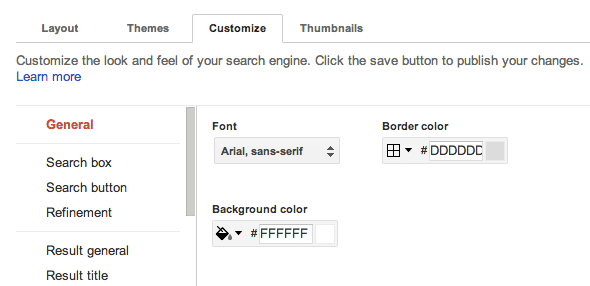
Though we commonly refer to web browsing as “surfing,” most of us aren’t surfers at all. We often rely on search engines to take us directly to the information we want at that moment. If your site is more than thimble-sized, offering search to your visitors is a no-brainer.
There are two ways to go with site search: you may use ExpressionEngine itself (with or without additional add-ons), or you pick Google’s proprietary search algorithms via its Custom Search Engine service, a free tool that allows a Google search to be embedded in your website.
Although we love the content management system ExpressionEngine at Hop Studios, we frequently replace EE’s search tool with a customized installation of Google Custom Search. (There are certain reasons to stick with ExpressionEngine’s search functionality, but usually Google’s advantages win out; it’s pretty hard to beat the most popular search engine in the world.)
Although there is no cost to using Google CSE, the Google logo is required to be displayed on the search box and search results page, and Google Adsense advertising shows up in the results (though you should be getting a portion of that revenue; let us know if you aren’t!) On the other hand, if you are willing to pay, for about $100 per year minimum you can remove the branding and the ads by using Google Site Search.
Here’s the important bit: Google is always improving CSE and in late 2013, Google made some bigger changes and improvements to the way Google Custom Search Engine works. However, to get them, you need to upgrade your old HTML code. The latest CSE version has:
- instant search completion as you type
- gives the site owner direct control over additional autocomplete results
- sorting by date or by relevance
- better spell checking
- integrated image search results
- and finally—and for us, this is the big win—the CSE code loads asynchronously, which means that page load time for your site is reduced. (Asynchronous code means that the page can load its other elements as needed, instead of waiting on CSE to finish displaying.)
If you want to keep up to date on the CSE changes, you can read the Google Custom Search blog … or you can just let us geek out for you and tell you the important bits… like in a blog post… like the one you’re reading now 😊 .
Finally, if you want to get truly fancy, it is also possible to customize the way Google CSE records (indexes) your site data, and how it displays results—so you can offer even better search customization. Details are available if you want them, but this isn’t necessary for most types of sites.
What does all this mean to you today? If you use Google CSE now, you really ought to update your CSE code—or ask us to do so for you—so that you’re offering your visitors the best possible search experience on your site. And if you don’t use Google CSE, you may want to consider switching to it.
Comments